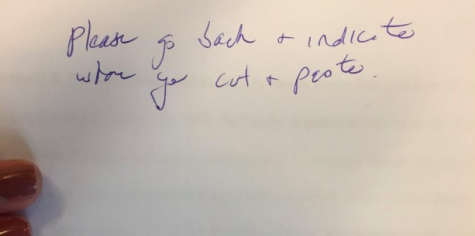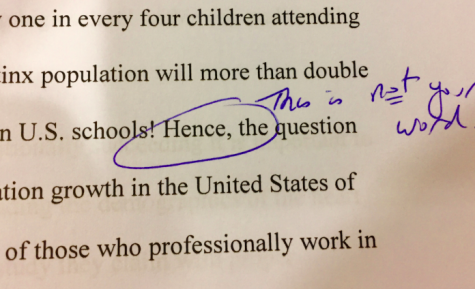Letter to the editor: More than 277 signatures from across the country sign a letter to Acting President Marisa Kelly
Editor’s Note: This email was forwarded to The Suffolk Journal with a list of signatories. The Journal has not yet had communication with Acting President Marisa Kelly regarding the email that they sent to her email Saturday night.
Dear President Kelly:
We, the undersigned, would like to respond to an incident at your institution that has come to our attention. If you are not aware of this incident, we would like to bring it to your attention (and please forgive the intrusion if you have been made aware).
We felt compelled to write to you directly after reading a heartbreaking post on Facebook yesterday afternoon. The post involved a blog post by a Suffolk student named Tiffany Martinez entitled “Academia, Love Me Back,” who reports that she recently received a paper back from a professor in one of her classes in which a literature review she wrote was greeted with derision and mistrust.
Ms. Martinez, who is a McNair Fellow and a regular member of the Dean’s List, was singled out in her class by the professor, who handed back her paper and declared, “this is not your language.” On the top of the first page, the professor had written, “Please go back and indicate where you cut and paste.” And on a page where Ms. Martinez used the word, “Hence” to begin a sentence, the professor scrawled in the margin, “This is not your word,” with the word “not” underscored twice. In effect, the professor was telling this young woman, who happens to be a Latina, first-generation student, that they did not believe she had written her paper simply because they could not believe that a student like her—that is, a first-generation, woman of color–could use a transitory word correctly in a sentence.
Ms. Martinez did not use the professor’s name in her blog post, so s/he can avoid being ridiculed and publicly shamed for what we would deem to be an egregious instance of unprofessionalism. Students look to us for affirmation, not just students like Ms. Martinez, but students of all backgrounds. Some arrive at schools like Suffolk well-prepared for the rigors of academic life, others arrive less-prepared, but demonstrate their willingness to do whatever is necessary to bring their skills to an acceptable level to achieve academic success. While no professor wants to conclude that students have submitted work that includes information that is not their own, we firmly believe that in instances like what Ms. Martinez describes, public shaming is unwarranted and unnecessary. In point of fact, there are a number of software programs aimed at spotting plagiarism in student writing that the professor might have utilized instead of jumping to conclusions. But beyond that, we believe that a faculty member who has concerns about a student’s work should take it up with the student privately and work to determine what an appropriate course of action might be in the event that there is questionable information in an essay (which most certainly should involve giving the student an opportunity to correct their mistake).
We suspect that Suffolk has mechanisms to deal with student misconduct. But we wonder what sort of mechanisms exist in situations where a faculty member engages in misconduct. In your recent blog post, which talks about diversity at Suffolk, you sounded a note of urgency regarding the importance of creating an atmosphere conducive to equity and inclusion. We cannot imagine that the act of publicly shaming a student suspected of plagiarism (mind, without any concrete proof, beyond the racist assumptions that attach to said student’s person) is in any way consistent with your claim. This is most unfortunate, because with a single comment on an essay, this faculty member has brought efforts at creating an inclusive and equitable environment to a grinding halt. You may not agree. You may feel that this is not a matter that merits your involvement. But as the large number of signatories on this letter is meant to attest, it is clear that the hurt Ms. Martinez expresses so poignantly in her blog post has moved a large number of readers who wish to voice their concern.
As you point out in your blog, we are beset on all sides by news of yet another instance of excessive force that leads to the death of an unarmed citizen. You rightly suggest that a firm commitment to diversity, equity, and inclusion is one of the best ways to combat the despair that greets us when we hear tragic news of another life taken senselessly. Please know that we have great respect for your institution. Several of us have friends who teach at Suffolk, who speak with enthusiasm about the intellectual curiosity and commitment to excellence they see in Suffolk students. Indeed, one of us recruited one of your alumni to the doctoral program in Africana Studies, where she is thriving. You should also know that, though it is unlikely that you have met the large preponderance of signees of this letter, we nonetheless believe that the actions of one faculty member in no wise reflects on your sincerity and integrity. But this is a moment where it is abundantly clear that a single instance of thoughtless bigotry has tremendous resonance at a time when we have seen an exponential increase in the number of racist, anti-immigrant, anti-LGBTQ, anti-first-gen/low income sentiments expressed on college campuses.
The actual point of this email is to express our support for Ms. Martinez and to all students of similar caliber. What we would tell her, had we the opportunity, is that the bigotry of one faculty member in no way diminishes her accomplishments or her prospects. We likewise believe that her determination has been strengthened and that this incident has only increased the likelihood that she will become a member of the professorate. In closing, we wish to express our unwavering support for your efforts to make Suffolk a reflection of the best ideals of our national project and we wish you the very best in your efforts.
Sincerely,
Herman Beavers, Ph.D., Professor of English and Africana Studies, University of Pennsylvania
Your donation will support the student journalists of Suffolk University. Your contribution will allow us to cover our annual website hosting costs.




Make my Assignment • Aug 18, 2017 at 1:57 am
Many thanks for sharing this very informative post. Have a super nice day!!
make my assignment
Chris Philippo • Nov 3, 2016 at 4:34 pm
“we wonder what sort of mechanisms exist in situations where a faculty member engages in misconduct”
I’d asked that question of administrators at my university years ago and never got an answer. It has seemed to me that universities in general might not have such mechanisms, or might not publicize them, or might not use them properly if they exist.
I’d reported an untenured professor (not at Suffolk!) who had joked in class about torturing one of his minority teaching assistants by shocking her with electrodes until she would scream, who had his teaching assistants write his lectures and his lecture notes for him which he would then present as his own work, who knowingly permitted open cheating by students during exams all semester long, etc., and it turned out to my dismay that the department chair, undergraduate dean, university president, etc. all supported such behavior.
“we believe that a faculty member who has concerns about a student’s work should take it up with the student privately”
Agreed!
“the professor was telling this young woman, who happens to be a Latina, first-generation student, that they did not believe she had written her paper simply because they could not believe that a student like her—that is, a first-generation, woman of color–could use a transitory word correctly in a sentence.”
The comment “This is not your word”, while unhelpful and seemingly unjustified, is not in itself proof of racial bias. Just as the professor appears to have had no evidence to support an accusation of plagiarism simply on the basis of using the word “hence”, the student appears to have had no evidence to support an accusation of racism simply on the basis of using the sentence “This is not your word.” Perhaps the professor had trouble imagining a young person using the word (though I find it easy to imagine a student of any age using it). Perhaps the professor intended to write “This is not the word you want to use here” but ended up conveying something else through being too terse (though that seems improbable). Perhaps the professor did have some racial bias underlying the comment. We simply don’t know!
Perhaps the Suffolk Journal could reach out to all the professors in the department in question and ask for an explanation of the comment? The professor who wrote it could respond to the Suffolk Journal anonymously if need be, perhaps?
Ali • Nov 2, 2016 at 1:01 pm
Everyone who is in support of this Tiffany Martínez is uneducated and should not be speaking publicly in such manner about an issue they cannot comprehend. First of all, as any person who attended MIDDLE SCHOOL in the US should know, writing an essay the same way you speak daily is the absolute worst thing you can do. Imagine me writing this but in my usual day to day language ” Tiffany Martínez accused her professor of racism over a simple remark” now in my daily words this sounds like this ” Tiffany Martínez was like my ‘ my professor is such a racist yo! he said i cant write stuff like this like who does he think i am!’ ” You see how that sounds? Stupid. Now I will assume that a PROFESSOR of COLLEGE ENGLISH does not expect his students to write how they speak, let alone remember how they all speak. What this professor meant is that she was using language she had never before used in her works, which is a HUGE red flag for English. You sir/ma’am, are just as whiny as Tiffany Martínez. It stuns me that a professor from UPENN is in support of Martínez. She cannot handle criticism for once and went straight to the media.
Kudisan Kai • Nov 1, 2016 at 2:57 am
What this professor did is inexcusable. He/she could have easily utilized the software that clearly exposes plagiarism, as many of us have in our industry. I hope that the student receives a public apology and the Professor is reprimanded accordingly. This should set the precedent for this type of behavior.
Kudisan Kai
Former Associate Professor
Berklee College of Music
Marcos DeQuiroz • Oct 31, 2016 at 5:54 pm
I am appalled by what the proffersor assumed. Wait…. Do you now think we know how to use the words hence and appalled?
Go find a different career in which you are not responsible for the education of the future of our planet.
Andrea Romero • Oct 30, 2016 at 4:18 pm
This type of professor behavior is unacceptable. I
Carol Ann Rotella • Oct 30, 2016 at 4:18 pm
Thank god I’m transferring next semester
Thomasena Farrar • Oct 30, 2016 at 2:31 pm
The actions of the professor towards Ms. Martinez should be deemed intolerable and promptly addressed. As an African-American woman, and a freelance writer with an MS degree that I obtained with honors, I am more than offended. It is disgusting to read about this happening in 2016. Please expect and demand better.
Luisa López • Oct 30, 2016 at 1:52 pm
Professors should encourage their students to be successful regardless their ethnicity. Shameful to see these comments coming from an “educated” person.
Linda Husselbee • Oct 30, 2016 at 1:05 pm
This student deserves an apology publicly and this professor deserves at the very least a suspension.